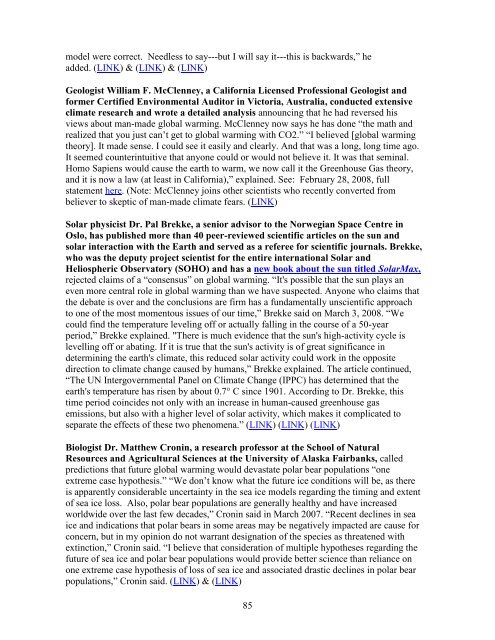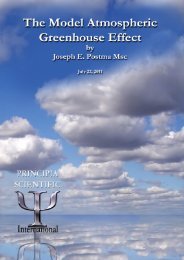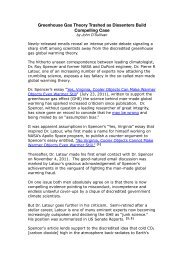Than 1000 International Scientists Dissent Over Man-Made Global ...
Than 1000 International Scientists Dissent Over Man-Made Global ...
Than 1000 International Scientists Dissent Over Man-Made Global ...
You also want an ePaper? Increase the reach of your titles
YUMPU automatically turns print PDFs into web optimized ePapers that Google loves.
model were correct. Needless to say---but I will say it---this is backwards,‖ he<br />
added. (LINK) & (LINK) & (LINK)<br />
Geologist William F. McClenney, a California Licensed Professional Geologist and<br />
former Certified Environmental Auditor in Victoria, Australia, conducted extensive<br />
climate research and wrote a detailed analysis announcing that he had reversed his<br />
views about man-made global warming. McClenney now says he has done ―the math and<br />
realized that you just can‘t get to global warming with CO2.‖ ―I believed [global warming<br />
theory]. It made sense. I could see it easily and clearly. And that was a long, long time ago.<br />
It seemed counterintuitive that anyone could or would not believe it. It was that seminal.<br />
Homo Sapiens would cause the earth to warm, we now call it the Greenhouse Gas theory,<br />
and it is now a law (at least in California),‖ explained. See: February 28, 2008, full<br />
statement here. (Note: McClenney joins other scientists who recently converted from<br />
believer to skeptic of man-made climate fears. (LINK)<br />
Solar physicist Dr. Pal Brekke, a senior advisor to the Norwegian Space Centre in<br />
Oslo, has published more than 40 peer-reviewed scientific articles on the sun and<br />
solar interaction with the Earth and served as a referee for scientific journals. Brekke,<br />
who was the deputy project scientist for the entire international Solar and<br />
Heliospheric Observatory (SOHO) and has a new book about the sun titled SolarMax,<br />
rejected claims of a ―consensus‖ on global warming. ―It's possible that the sun plays an<br />
even more central role in global warming than we have suspected. Anyone who claims that<br />
the debate is over and the conclusions are firm has a fundamentally unscientific approach<br />
to one of the most momentous issues of our time,‖ Brekke said on March 3, 2008. ―We<br />
could find the temperature leveling off or actually falling in the course of a 50-year<br />
period,‖ Brekke explained. "There is much evidence that the sun's high-activity cycle is<br />
levelling off or abating. If it is true that the sun's activity is of great significance in<br />
determining the earth's climate, this reduced solar activity could work in the opposite<br />
direction to climate change caused by humans,‖ Brekke explained. The article continued,<br />
―The UN Intergovernmental Panel on Climate Change (IPPC) has determined that the<br />
earth's temperature has risen by about 0.7° C since 1901. According to Dr. Brekke, this<br />
time period coincides not only with an increase in human-caused greenhouse gas<br />
emissions, but also with a higher level of solar activity, which makes it complicated to<br />
separate the effects of these two phenomena.‖ (LINK) (LINK) (LINK)<br />
Biologist Dr. Matthew Cronin, a research professor at the School of Natural<br />
Resources and Agricultural Sciences at the University of Alaska Fairbanks, called<br />
predictions that future global warming would devastate polar bear populations ―one<br />
extreme case hypothesis.‖ ―We don‘t know what the future ice conditions will be, as there<br />
is apparently considerable uncertainty in the sea ice models regarding the timing and extent<br />
of sea ice loss. Also, polar bear populations are generally healthy and have increased<br />
worldwide over the last few decades,‖ Cronin said in March 2007. ―Recent declines in sea<br />
ice and indications that polar bears in some areas may be negatively impacted are cause for<br />
concern, but in my opinion do not warrant designation of the species as threatened with<br />
extinction,‖ Cronin said. ―I believe that consideration of multiple hypotheses regarding the<br />
future of sea ice and polar bear populations would provide better science than reliance on<br />
one extreme case hypothesis of loss of sea ice and associated drastic declines in polar bear<br />
populations,‖ Cronin said. (LINK) & (LINK)<br />
85





